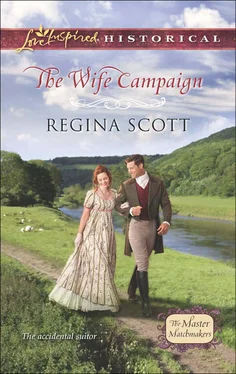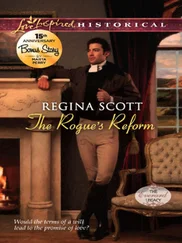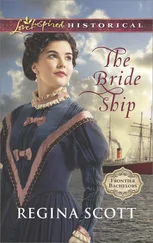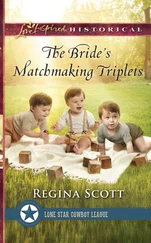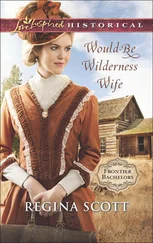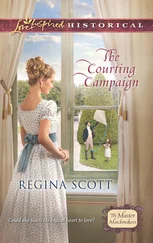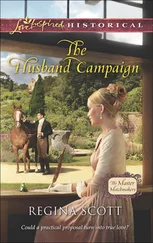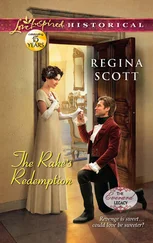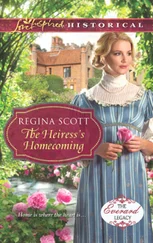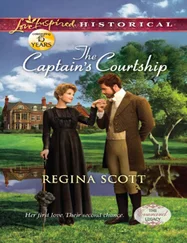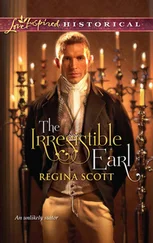On the chamber story, Whit spun around the newel and into the room at the top of the stairs. He’d been given this bedchamber as a boy, and though it was the smallest of the seven, he still found it the most comfortable. He stopped in the center, the great bed before him, the hearth at his back, and thundered, “Quimby!”
His valet entered from the dressing room, a coat in either hand. As always, a pleasant smile sat on his lean face. Though his straw-colored hair tended to stick out in odd directions, his clothes, and the ones he kept for Whit, were impeccable.
“Good,” he said. “You’re back. Which do you prefer for dinner, the blue superfine or the black wool with the velvet lapels?”
“What I prefer,” Whit gritted out, “is to know why I have guests.”
“Ah.” Quimby lowered the coats but never so much that they touched the polished wood floor. “I believe each of the three invitations read that you are desirous to put an end to your bachelor state and would like to determine whether you and the lady suit.”
Feeling as if every bone in his body had instantly shattered, Whit sank onto the end of the bed. “You didn’t.”
“I did.” With total disregard for the severity of his crime or his master’s distress, Quimby draped the coats over the chair near the hearth. “You aren’t getting any younger, my lad. And we none of us are looking forward to serving your cousin should you shuffle off this mortal coil prematurely.” He glanced at Whit and frowned. “You look rather pale. May I get you a glass of water? Perhaps some tea?”
“You can get these people out of my house,” Whit said, gathering himself and rising. “Or, failing that, find me other accommodations.”
Quimby tsked. “Now, then, how would that look? You have three lovely ladies here to learn more about. I chose them with great care. I thought you rather liked Lady Amelia Jacoby.”
It was true that the statuesque blonde had caught Whit’s eye at a recent ball, but he’d never had any intentions of moving beyond admiration. “If I liked her,” Whit said, advancing toward his valet, “I was fully capable of pursuing her without your interference.”
“Of course,” Quimby agreed. He came around behind Whit and tugged at the shoulders of his tweed coat to remove it. “Yet you did not pursue her. I also invited Miss Henrietta Stokely-Trent. You did mention you thought she had a fine grasp of politics.”
He’d had several interesting conversations with the determined bluestocking last Season. “She’s brilliant. But perhaps I want more in a wife.”
“And perhaps you’ve been too preoccupied to realize what you want,” Quimby countered, taking the coat to the dressing room.
“Rather say occupied,” Whit corrected him, unbuttoning the waistcoat himself. “Parliament, estate business, the orphan asylum...”
“The sailor’s home, the new organ for the church,” Quimby added, returning. “I am well aware of the list, my lord. You are renowned for solving other people’s problems. That’s why I took the liberty of solving this problem for you.” He unwound the cravat from Whit’s throat in one fluid motion.
“Dash it all, Quimby, it wasn’t a problem!” Whit pulled the soiled shirt over his head. “I’d have gotten around to marrying eventually.”
“Of course.” Quimby took the shirt off to the dressing room for cleaning.
Whit shook his head. “And why invite Miss Hollingsford? I don’t even recall meeting her.”
Quimby returned with a fresh shirt and drew it over Whit’s head. “I don’t believe you have met, sir. I simply liked her. I thought you would, too.”
He had liked her immediately. All that fire and determination demanded respect, at the least. That wasn’t the issue.
Whit closed his eyes and puffed out a sigh as his valet slipped the gold-shot evening waistcoat up his arms. “Have you any inkling of what you’ve done?”
He opened his eyes to find Quimby brushing a stray hair off the shoulder. “I’ve brought you three beautiful women,” he replied, completely unrepentant. “All you need do is choose.”
Whit stepped back from him. “And if I don’t?”
“Then I fear the next batch will be less satisfactory.”
Whit drew himself up. “I should sack you.”
“Very likely,” Quimby agreed. “If that is your choice, please do it now. I understand Sir Nicholas Rotherford is seeking a valet, and as he recently married, I should have less concern for my future with him.”
Whit shook his head again. If Quimby had been anyone else, Whit would have had no trouble firing him for such an infraction. But he’d known Quimby since they were boys. The two had been good friends at Eton, where Peter Quimby, the orphaned son of a distinguished military man, had been taken in on charity. When Whit became an orphan, and the new Earl of Danning at fifteen, he’d offered his friend a position as steward.
“Who’s going to take orders from a fifteen-year-old?” Quimby had pointed out. “Make me your valet. They get to go everywhere their masters do. We’ll have some fun, count on it.”
At times over the past fifteen years, Whit thought Quimby was the only reason Whit had had some fun, even when duty dogged his steps. He couldn’t see sacking his friend now.
“Rotherford can find another valet,” Whit told him.
Quimby smiled as he reached for the coats.
“But don’t take that to mean I approve of this business,” Whit insisted. “I’ll do my best to clean up the mess you’ve made. I will be polite to our guests but expect nothing more. You can campaign all you like, Quimby, but you cannot make a fellow choose a wife.”
“As you say, my lord,” Quimby agreed, though Whit somehow felt he was disagreeing. “Now, which will you have tonight, the black coat or the blue?”
“Does it matter?” Whit asked as his valet held out the two coats once more. “By the time this fortnight is over, I’m the one most likely to be both black and blue, from trying to explain to three women that I don’t intend to propose.”
Chapter Two
Ruby was equally certain she would do no more than survive the fortnight as she and her maid were escorted to a lovely room overlooking the river. She’d tried to convince her father to return to London, but he’d refused, having Davis turn the coach once more and take them back to the Lodge, a quaint stone building tucked between the river and the rising hills.
Her father seemed even more certain than before that Lord Danning was part of some plan God had for her. After all, the earl had been waiting for her when she’d jumped from the coach. She didn’t believe God worked that way. God’s plans involved momentous things—war and peace, sun and rain and stars falling. Surely He wouldn’t intervene in the life of one Ruby Hollingsford.
Besides, she could take care of herself. She had her future all planned—good works, good books, a drive through the park and the opera on occasion. She didn’t need the unreliable companionship of a husband.
Hadn’t she managed in London alone when she’d been a child and her father had worked as a mudlark, scouring the banks of the Thames for treasure? After their wealth was established, hadn’t she endured the four years of tutelage at the Barnsley School for Young Ladies, where half the students shunned her because of her past? Wasn’t she spearheading the creation of a school in poverty-stricken Wapping? Hadn’t she survived when the one man she thought she might love turned out to be a scoundrel? The Earl of Danning would find her made of stronger stuff than the dewy-eyed Society damsels he probably courted.
But it did seem odd that, when she exited her room to try to persuade her father once more, the very first person she saw was the earl standing by the stairs.
Читать дальше
